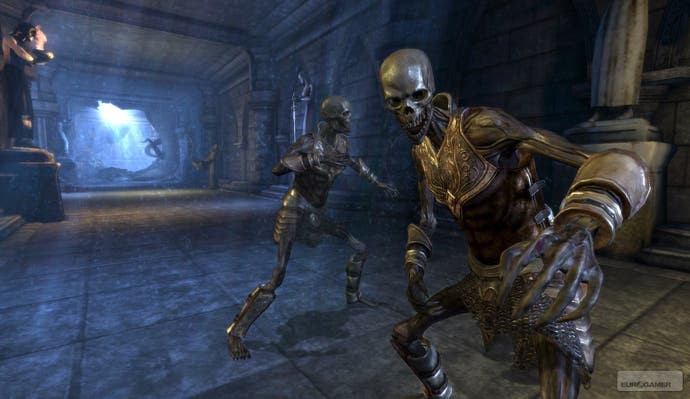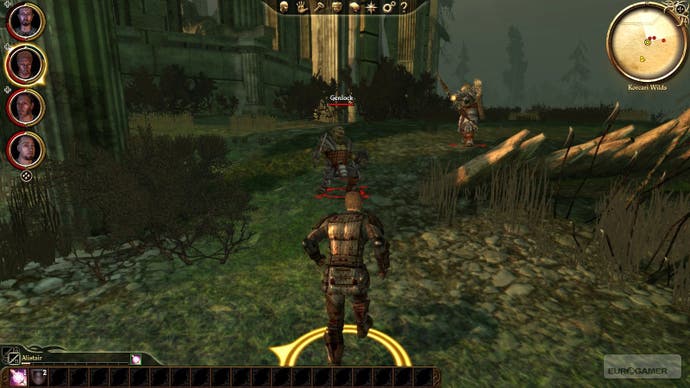Dragon Age: Origins
Dragon drop.
Since Baldur's Gate, BioWare has been on a worldwide genre tour. It took on the mighty, crap-spattered Star Wars franchise with almost unqualified success. It weaved a fantastical Far East adventure, blending martial arts with fairy-tale machinery. It created a completely new space-fi world with Mass Effect, and... well, it did Sonic Chronicles, too.
It's about time BioWare went back to its fantasy roots, and got the elves out for the lads. Its new world, Ferelden, is suffering from a Blight; a horde of Darkspawn that was last conquered 400 years ago, after which the Grey Wardens who defeated it became slowly seen as redundant. Now this Blight is returning, it finds a world that's ill-equipped to defeat it. Your character - one of six races, each of which have a completely different opening experience - is one of these Wardens, and it's your task to mobilise the kingdom to face the ancient threat.
One of the words that pops up whenever anyone talks professionally about Dragon Age is "mature". Considering that BioWare are pretty much built on their mature approach to storytelling - even Sonic Chronicles managed to have a script more intelligent and entertaining than the gameplay - I'm interested why Dragon Age has been singled out for its maturity.
Certainly, the clip of gameplay we're shown (along with a polite request not to leak the spoilers) shows a storyline that involves subject matter such as sexual abuse, betrayal, and a woman with both her knockers virtually out. Is this, I ask BioWare's founder, Ray Muzyka, what he means by maturity? He says not; the maturity comes from the balanced approach to fantasy.

"A lot of fantasy games, traditionally, have been high fantasy - Tolkienesque fantasy, where good battles evil. And there's another end of that spectrum, the low fantasy, which is a lot darker. Dragon Age is right in the middle - dark, heroic fantasy is what we're calling it - and it's the best of both worlds."
So, we can expect a certain amount of heroism, but nothing like a couple of naive wee hobbits chucking rocks at a Nazgul. Certainly, the clip we're shown through, which features a battle between Elves and Werewolves - doesn't play out as Disney fans might expect. The Blight vs. Grey Wardens theme might be High Fantasy, but the decisions you'll make will often seem less than heroic. During the presentation, those decisions were presented to us, as you'd expect, in the traditional dialogue tree. But to its credit, there was very little of the obvious good, evil, and neutral options that plague the genre. It was just options. And because the situation wasn't as morally straightforward as killing or rescuing a wide-eyed child, every side had a fairly valid point.
Muzyka expands on that. "Dragon Age has got that optimistic side, but it's got a dark side. Every choice has a consequence, and you need to feel that there are no safe or perfect choices. No choice feels purely good: you've got to think about what you want, and how your choice might move you towards that. So you're going to get a very different experience, depending on what choices you make."

So, I'm assuming you won't get to see much of the game just playing through it the once? "It's very replayable - right from the six Origin stories, which are several hours of hand-crafted gameplay, depending on which Origin you've chosen, from there, right away, you'll get to start making choices, and deciding how your player's journey is going to be different from everyone else's. And your own, if you're going to replay it." It's all, he says, about the internal debate that reasonable options cause.
Nevertheless, it's very familiar, and there are still the stereotypes and caricatures you'd expect from a traditional fantasy setting, even if your choices are less than black and white. But all this talk of replayability is, however, ignoring the possibility that the game might be such a breath-drainingly tedious affair that you won't want to finish it once. BioWare's games aren't everyone's cup of tea - I'm assuming that, 500 words in, you're at least a little Bio-curious. We were given a short hands-on - far too short to get an insight into the character progression, but enough to see the basic combat in action.









